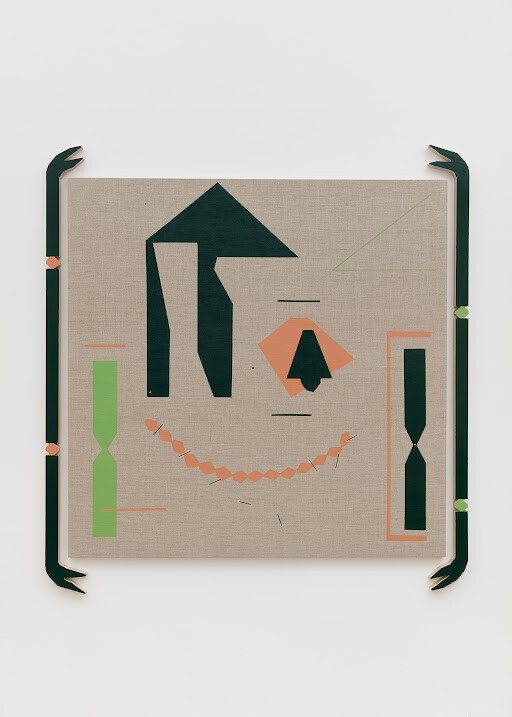
Caroline Kent; They won’t find us here, 2021; Acrylic on raw Belgian linen, acrylic on wood; Painting: 63.125” x 63.125”/ 160.34 x 160.34cm
In the early 1990s a generation of artists in the United States were using exhibitions to draw attention to real-world crises: by the time Bill Clinton was inaugurated in January 1993, AIDS was officially the #1 cause of death for men aged 25 – 44 in the country; the Los Angeles uprising had been declared the most destructive period of local unrest in US history; and the Culture Wars were in full force, after the Robert Mapplethorpe ‘obscenity’ hearing marked the nation’s first criminal trial over content in an exhibition. Terms such as multiculturalism, identity politics and marginalization signified spaces of contestation, while in art, the market had collapsed following a global recession, causing an unprecedented number of galleries to shutter.
It was in this context that artist Charles Gaines developed the exhibition ‘Theater of Refusal: Black Art and Mainstream Criticism’ for the Fine Art Gallery at the University of California, Irvine, in close collaboration with the gallery’s director, Catherine Lord. Presenting works by Jean-Michel Basquiat, Renée Green, David Hammons, Ben Patterson, Adrian Piper, Sandra Rowe, Gary Simmons, Lorna Simpson, Carrie Mae Weems, Pat Ward Williams and Fred Wilson—all little known artists at that time—‘Theater of Refusal’ intended to ‘reveal the strategies of marginalization and to propose an alternative,’ as Gaines described his approach then. Integral to the show was a reading room, for which Gaines accumulated articles and reviews about the participating artists that he highlighted to reveal limitations in the discourse of marginality and its instrumentalization by mainstream criticism.
On the occasion of the 30th anniversary of ‘Theater of Refusal’—in a social and political context that bears many similarities—this exhibition in downtown LA looks back at that seminal project and continues the theoretical investigation to understand its resonances today. Co-curator Homi K. Bhabha has called this process ‘retroaction.’ He suggests, ‘A conventional retrospective looks back from the summit of the present to synthesize the past by giving it a culminating shape. In contrast, ‘RETROaction’ brings forth the legacies of ‘Theater of Refusal’ in the early 1990s to interact with the lessons and lesions of art today. It takes a view of the present in all its decolonizing tumult—racial violence, pandemics, climate catastrophe, migration and displacement—pinpointing a critical moment of transition in the ‘90s from which to move forward.’
‘RETROaction’ presents works from the early 1990s by Charles Gaines, Lorna Simpson and Gary Simmons, who all participated in the original ‘Theater of Refusal: Black Art and Mainstream Criticism,’ as well as a new iteration of the exhibition, this time subtitled ‘Black Art and Reconstitution,’ presenting the work of ten artists who all embrace abstraction and materiality in their practice, selected by art historian, Ellen Tani, together with Gaines.
‘We speak less now of marginalization and refusal than of the world systems—historic and ongoing—that undergird those processes: capitalism, colonialism, racism. We consider Bhabha’s description of the way we can think of past work and its relation to the present moment through an investigation of strategies of marginalization from the ‘90s and how it has transitioned into a critical space—30 years later—now dominated by the issues of decoloniality, which in turn gives representation to those suppressed ideas of the ‘90s,’ says Gaines. ‘We chose to undertake an investigation of abstract art produced by Black artists to show that the controversies around representation—a significant context for the marginalization of their practices—continues today. Like the original project, ‘Theater of Refusal: Black Art and Reconstitution’ rethinks structures of artistic knowledge and the critical discourse that surrounds it.’
